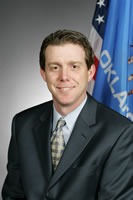In order to provide equal access and equal opportunity to people with diverse abilities, this site has been designed with accessibility in mind. Click here to view
Senate Committees Approve Bills to Shore up Teachers’ Retirement System
 Senator Mike Mazzei
Senator Mike Mazzei
Two bills aimed at shoring up the Teachers’ Retirement System of Oklahoma (TRS) are now headed to the full Senate for consideration. Sen. Mike Mazzei is the author of the measures, each of which would substantially reduce the 49 percent unfunded liability rate in the system within the next two decades. Combined, the bills would accomplish that feat in about half the time.
SB 1092 was approved by the Senate Retirement and Insurance Committee on Thursday. Mazzei explained the measure would increase the monies that the state, in combination with the school systems, puts into TRS. The increased employer contribution would be contingent upon available state dollars to cover that cost. Currently, the rate is 8 percent for common education employers, as well as two-year colleges and state agencies in the system. Four-year universities and colleges currently contribute 7.05 percent.
“Under SB 1092, the rate will be increased to 8.75 percent. That will infuse the retirement system with $36 million a year, which will grow as teacher salaries increase,” said Mazzei, R-Tulsa. “This adjustment could get the teacher retirement system on the path to being around 80 percent funded in 20 to 25 years.”
The second measure, SB 1119, was approved by the Senate Finance Committee on Tuesday. That measure would raise the dedicated stream of revenue from income and sales tax collections to pour additional money into TRS.
“SB 1119 incorporates an excellent idea from Treasurer Scott Meacham to take the dedicated level from 4.5 percent to 6.5 percent by fiscal year 2011. That will pour an additional $27 million a year for each half a percent incremental increase,” Mazzei said. “Over time, that additional infusion will get the teacher retirement system up to an 80 to 81 percent funded level in about 18 years.”
Mazzei said if both measures were enacted, it would produce a huge stimulus into the system that could help TRS reach an 80 percent funded rate in approximately 10 to 12 years.
“That would be incredible. Such immediate progress should probably improve our state’s bond ratings which would ultimately save even more dollars,” Mazzei said. “But more than that, it will ensure that we will honor Oklahoma’s promises to thousands of men and women who dedicated their lives to education in our state.”
On the other hand, if no definitive action is taken by lawmakers and the governor, Mazzei said the result would be nightmarish—not only for retired teachers, but for the economy of the entire state.
“We could find ourselves in a position of having to drastically cut areas of the budget, or face huge tax increases which would devastate the economy and drive capital out of the state,” Mazzei said. “In West Virginia, they finally got to the point of no return. They didn’t want to cut the budget, and they didn’t want to raise taxes, so they ended up borrowing $4 billion. As a sad result, 10 percent of their general budget every year goes just to making their interest payments. Those are about $700 million a year. Fortunately, if we take action now, we still have time to avoid those scenarios.”
Both bills now move to the full Senate for further consideration.
 Oklahoma Senate
Oklahoma Senate

